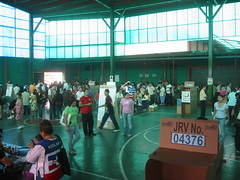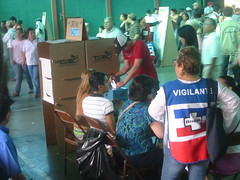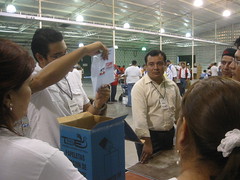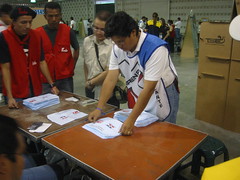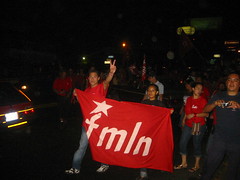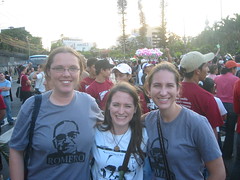Amber McChesney-Young
Digital Democracy
November 7, 2006
Dramatic Action and the Movement to Close the School of the Americas
In November 1990, Fr. Roy Bourgeois, Charlie Liteky, and Patrick Liteky, accompanied by local media, entered the U.S. Army School of the Americas at the Ft. Benning military base in Georgia. There they placed images of six Jesuit priests and their housekeeper and daughter, who had been killed in El Salvador the previous November, along with a letter calling for the closure of the school. They splashed human blood on the pictures and the floor and the walls, and went outside, where they placed a white cross at the base of the sign marking the School of the Americas. They splashed blood on the sign, then on themselves, and they lay down and waited to be arrested. This was one of the first actions of a movement to shut down the School of the Americas, a U.S. Army-run combat-training school for Latin American soldiers. The movement has grown over the years, but throughout its development the use of dramatic direct action has played a key role in building the movement and advancing its goals.
The U.S. Army School of the Americas (SOA), which was renamed the Western Hemisphere Institute for Security Cooperation (WHINSEC or WHISC) in 2001, was started in 1946 in the Panama Canal Zone and moved to Ft. Benning, Georgia in 1984. It was created as a Cold War tool to keep Communism out of Latin America, but it still remains open after the fall of Communism, and it continues to train Latin American soldiers. Over 60,000 soldiers have graduated from the school.
Graduates of the School of the Americas have been responsible for major human rights abuses in Latin America. SOA Watch says, "These graduates have consistently used their skills to wage a war against their own people. Among those targeted by SOA graduates are educators, union organizers, religious workers, student leaders, and others who work for the rights of the poor. Hundreds of thousands of Latin Americans have been tortured, raped, assassinated, 'disappeared,' massacred, and forced into refugee by those trained at the School of Assassins" ("What is the SOA?").
Some of the more famous abuses took place in El Salvador. Two of the three people found responsible for assassinating Archbishop Oscar Romero in 1980 were SOA graduates.1 Three of the five responsible for the rape and murder of four U.S. churchwomen (three nuns and a laywoman) were SOA graduates, and ten of the twelve responsible for the massacre at El Mozote in 1981, where over 900 people were killed, and nearly the entire village, along with the surrounding area, was wiped out, were SOA graduates. In 1989, in an action that actually helped bring about the end to El Salvador's civil war because of the outrage it caused, six Jesuit priests, their housekeeper, and her daughter were brutally murdered at the University of Central America in El Salvador. Nineteen of the 26 found responsible were SOA graduates, according to a 1993 United Nations Truth Commission Report. In 1996, in what led to a great uproar, the Pentagon was pressured into releasing manuals that had been used at the school from 1982 to 1991 which taught torture, blackmail, and execution. This was significant in helping build the movement to close the school (Gill 212-213).
To understand the purpose of the SOA, one must look at U.S. foreign political and economic relations. The United States has provided financial and military support to Latin American countries to keep the people it likes in power, and when the people it doesn't like have been in power, the U.S. has backed the insurgency and supported coups. In the 1980's, El Salvador went through a civil war between the right-wing government and the left-wing insurgency, which involved massacres, kidnappings, disappearances, and torture. The U.S. gave significant support to the Salvadoran government throughout the war.
Today many of the conflicts in Latin America have calmed down, but the U.S. continues to train Latin American soldiers, and there continues to be criticism of the school. In the book School of Assassins: Guns, Greed, and Globalization, Jack Nelson-Pallmeyer, Professor of Peace and Justice Studies at St. Thomas University, looks at the school in the larger framework of globalization and economics. He argues that the SOA is training soldiers in order to maintain rule which favors free trade and structural adjustment programs imposed by the IMF and World Bank. Nelson-Pallmeyer says, "U.S. foreign policy generally and the SOA specifically support policies and systems that enrich a powerful minority while leading to widespread poverty, gross inequalities, a strained environment, and constricted or nonexistent democracy" (14). In other words, the issue is not limited to high-profile assassinations. The SOA is a symbol of U.S. foreign relations and imperialism.
It was a background in a different kind of U.S. involvement in Latin America that led a small group of people to found School of the Americas Watch in 1990. Fr. Roy Bourgeois, a Maryknoll priest, had spent five years in Bolivia as a missionary after his ordination in 1972. His experience there taught him about the lives of the poor in Latin America. He saw extreme poverty, and he witnessed people being arrested, tortured, and murdered. His experience in Bolivia was the foundation for his later activism. He traveled to El Salvador after the killings of the four churchwomen, two of whom were friends of his, and upon returning to the U.S. he traveled to churches around the country talking about the horrors in El Salvador which our government was supporting.
In 1983, before the SOA had moved to Ft. Benning, Fr. Bourgeois read a small story in the New York Times saying that about 500 Salvadoran soldiers had arrived at Ft. Benning for combat training (Father Roy). He decided to take action, so he went to Columbus, Georgia, where Ft. Benning is located. After doing community education and organizing, he and two others snuck into the fort dressed as high-ranking military officials, found the barracks where the Salvadorans were staying, climbed a tree, and waited for dark (Father Roy). They had brought with them a boom box with loud speakers, and when the lights in the barracks went out, they blasted the last sermon of Archbishop Oscar Romero (Father Roy). Fr. Bourgeois wanted to "call as much attention as he could to the training and to 'raise enough hell' to stop it" (Hodge and Cooper 92). This was a precursor of the dramatic direct actions used in the movement to shut down the SOA.
Other early SOA Watch members had also worked in Latin America in the '70's and '80's and the movement was heavily based on what remained of the U.S. Central America solidarity movement that arose as a result of issues like El Salvador's civil war and U.S. support for the Nicaraguan Contras (Gill 201-202). In The School of the Americas: Military Training and Political Violence in the Americas, Lesley Gill, a Professor of Anthropology at American University, describes the growth and development of the movement to close the SOA. She writes about how the influence of liberation theology; the experience of many priests and nuns working as missionaries in Latin America; and the murders of Romero, the churchwomen, and the Jesuits in El Salvador all created a basis for a movement primarily made up of middle-aged white religious people expressing their outrage at the existence of this institution (Gill 202-203). Because of the work that many had done concerning Latin America, they already had a knowledge base of what the experience was for the people who suffered the most from an institution like the SOA (Gill 202).
The notion of solidarity is important in the movement because unlike most social movements, the members are not the ones being oppressed. Movements like civil rights, women's rights, and gay rights have all been primarily made up of the people who were most affected by the changes they were working for. These movements have involved other people (such as whites in the civil rights movement), but they have been primarily made up of the people experiencing the oppression. The movement to shut down the School of the Americas was started by white people from the United States, and that is where solidarity becomes important. The religious base for the movement helps explain this to an extent. Solidarity is an important value in Catholic social teaching. It is also important to note that the movement is conscious of the fact that its members are the privileged ones. On the SOA Watch web site they say, "We have a lot to learn from our brothers and sisters in Latin America and the Caribbean who have been fighting oppression for the past 510 years. To do so, we must come to grips with our own privilege and recognize how it shapes our assumptions about struggle, organizing and the future" ("Building the Movement").
The church provided ready-made networks, which the movement used to spread the message about the SOA through churches and schools, but it was more the dramatic actions of the movement that grabbed the attention of the public and created the traditions that hold the movement together today. The first actions after the creation of School of the Americas Watch were a 35 day hunger strike at the entrance to Ft. Benning, then the action I described at the beginning of this paper, commemorating the first anniversary of the killings of the Jesuits. That protest started an annual tradition, and every November since there has been a protest at the SOA. Still, these protests did not attract much attention, and the protests remained small until 1995, when a group of thirteen protesters decided to cross the line that marked the boundaries of Fort Benning, risking arrest (Gill 208-9). Their arrest and subsequent jail time of three to six months "stoked the moral outrage of movement veterans and advanced the cause of the movement in a way that neither the judge nor the army anticipated" (Gill 210). After that, as well as the 1996 release of the "torture manuals," the movement grew significantly and crossing the line became a part of the tradition. In 1999, twelve thousand people attended the protest, and five thousand crossed the line (Gill 209).
Crossing the line is one of the forms of dramatic action I will examine here. The movement uses many cultural forms to build itself and to advance its goals, from music to drama to giant puppets, but I have chosen to focus on three particular dramatic actions that take place at the annual November protest and vigil: the funeral march, die-ins, and crossing the line. SOA Watch has combined the dramatic flair of the Black Panthers with the nonviolence and religious component of the civil rights movement. In The Art of Protest, T.V. Reed, Director of American Studies and Professor of English at Washington State University, describes the black power movement saying that much of the movement, "particularly the Black Panther Party, can be understood as a kind of theatrical performance" (42). "All politics involves a theatrical element," he says (42). The dramatic actions at the SOA protest grab the attention of the media and the public, and they attract people to join the movement.
The Sunday morning of the November protest starts with a solemn funeral procession in remembrance of those who have died at the hands of graduates of the SOA. The procession is led by people wearing black cloaks and white faces carrying black coffins. Behind them thousands of people march, many carrying white crosses or other symbols bearing names of the dead. A group of people sing out the names of people who have been killed one by one. After each name, everyone raises their crosses and sings the response: "Presente."
In The Art of Protest, Reed outlines the functions of culture in movements, and the first one applies to this in particular: "Encourage. Individuals should feel the strength of the group. Singing in mass rallies can move a person out of the individual self to feel the strength of the group" (299). As Reed discusses in his chapter on music in the civil rights movement, singing unites people and maintains an atmosphere of calm and nonviolence (29). While the litany of the funeral march is not the same as the songs of the civil rights movement, there are clear similarities in the goals of collective singing. However, this action is not just a mass of people singing together. It is a very dramatic memorial for hundreds of dead people, and the slow solemn march along with the raising of the crosses adds a dimension to it beyond music. The action serves to remind the protesters of their purpose and to convey their purpose to the rest of the world. It is a very visible and striking form of protest, different from most protest marches one encounters. It has become a trademark and tradition of the movement.
As the procession arrives at the gates of Ft. Benning, affinity groups and individuals are invited to participate in direct action ("Call for Direct Action"). For many that means "crossing the line," which, post-9/11, is now a barbed wire-topped fence, and for others it can mean any number of other forms of action. One common form of protest on both sides of the fence is the die-in, where people lay down and pretend to be dead, often with fake (or real) blood, acting out the deaths that result from the military training at the SOA, and helping people understand what it's like to live in a place where you do see people on the ground, shot to death. The die-in is a form of protest that has been used in many other movements, so, unlike the funeral march, which is relatively unique, the die-in links the protest to other movements protesting unjust killings and unnecessary deaths by using the same action. Reed describes how ACT UP, an organization fighting against AIDS, used die-ins for their cause as a way to emphasize that people were being killed, not bringing their deaths upon themselves (195). The anti-SOA die-ins can be looked at similarly. They are directly blaming the SOA for these deaths. One of the first SOA protests was a die-in, as I described in the introduction. Die-ins are very dramatic and theatrical. They can convey very strong emotions and therefore hold a great amount of power for those watching and those participating.


The act of "crossing the line" is very dramatic, and of these dramatic actions, it has probably drawn the most people to the movement. When a group crossed the line the first time in 1995 and were arrested and jailed, the attention raised a lot of awareness which drew more people to the movement (Gill 209). Those first few years, a small number of people came to protest, but it has grown dramatically over the years, and the 2005 estimate by SOA Watch was 19,000 people ("Thirty-one Nonviolent Activists Sentenced"). As Gill says, in 1999 five thousand people, a large proportion of those present, crossed the line (209). However, since 9/11 the number of line-crossers has dropped significantly because of a newly erected fence. It used to be that if you crossed the line there was a relatively slim chance of jail time (because of the sheer magnitude of people), but now it is almost certain. People can spend up to six months in prison.
With a fence topped with barbed-wire, it takes a lot more effort to cross the line than it did when it was a line on the ground, but as people throw cardboard over the top to go over or lift the bottom of the fence to go under, the drama remains. The fact that there are a significant number of priests and nuns and older people crossing adds even more to the act in what Reed refers to as a "transgression of cultural codes" (297). Of the 31 people arrested and sentenced to prison for the 2005 protest, eight were 70 years or older (two of them aged 81), and fifteen were 60 years or older ("Thirty-one Nonviolent Activists Sentenced"). Our culture's regular view of priests and nuns is not that of people who would climb on their knees under a fence, trespassing and therefore breaking the law, cover themselves in fake blood, lay down, and wait to be handcuffed and taken to jail. That is a transgression of cultural codes, which, as Reed argues, has a great impact on the influence of a movement on society by altering people's concepts of cultural codes (297).
The movement to close the School of the Americas has had some success over the years, but the school still remains open. Technically, the SOA did close in December 2000 because of pressure from the public and the bad reputation the SOA had acquired. However, a new school called the Western Hemisphere Institute for Security Cooperation opened in the same place with the same people in charge and nearly the same curriculum in place in January 2001. It was clear to many that the name change was essentially skin-deep (Nelson-Pallmeyer 120-121), and while it has increased the amount of human rights training, the school remains basically the same. Still, it shows that the movement was exerting enough pressure that something had to be done, though it was not a satisfactory solution for those trying to shut down the school for good. Another sign of success is the growing numbers of people involved in the movement, and the fact that every year legislation in the House to close the school gets closer and closer to passing.
One key aspect of the movement has been that its actions are not just limited to the November protest, but that every spring Representative Jim McGovern (D-MA) regularly introduces legislation to close the school, and SOA Watch organizes lobbying in Washington DC to try to get the legislation to pass. Without the well-known protest which shows that tens of thousands of people support the movement enough to travel to Georgia from around the country, the lobbying would hold much less weight, but without the lobbying and actions in Congress, the protest would have very little actual impact in its goal to shut down the school. These two actions complement each other well in the movement to shut down the school.
One challenge the movement faced was how to frame its goals. Did it just want to shut down the school, or was the real issue U.S. foreign policy, exploitation, and military interventionism? (Gill 227). Closing the school is a feasible goal, but "Doing away with U.S. imperialism was another matter" (Gill 228). However, especially prompted by the growing anti-globalization movement and the 1999 Battle of Seattle, SOA Watch has been framing itself within the larger picture of globalization (Gill 229). If one looks at the SOA Watch web site, there is a page specifically devoted to the SOA in terms of labor and globalization ("SOA, Labor & Globalization"). Still, it is an issue of finding balance, and there are other disputes about methods and attitudes especially as more young, non-religious people join the movement (Gill 230).
Despite some internal disputes, the anti-SOA movement has succeeded in tarnishing the name of the School of the Americas and keeping alive the memories of those who have been killed. It has used dramatic action as an important way to attract attention and members to its cause as well as to build the movement from within, strengthening its resolve and commitment. It has been sure to get the media to cover its actions, and it has produced a number of documentaries about the issue, which highlights the dramatic actions even more. The movement still has a lot of work to do, especially if it is concerned not just with closing the school but changing the structures that create a need for the school. However, the movements used so far have had a significant impact, and the movement is young and still has time to grow and develop.
Works Cited:
"Building the Movement From the Bottom Up." School of the Americas Watch. 7 Nov. 2006 <http://www.soaw.org/new/article.php?id=724>.
"Call for Direct Action: November 2006." School of the Americas Watch. 7 Nov. 2006 <http://www.soaw.org/new/article.php?id=1091>.
Father Roy: Inside the School of the Assassins. Dir. Robert Richter. Narr. Susan Sarandon. Videocassette. Richter Productions, 1997.
Gill, Lesley. The School of the Americas: Military Training and Political Violence in the Americas. Durham: Duke Univ. Press, 2004.
Hodge, James and Linda Cooper. Disturbing the Peace: The Story of Father Roy Bourgeois and the Movement to Close the School of the Americas. Maryknoll, NY: Orbis Books, 2004.
Nelson-Pallmeyer, Jack. School of Assassins: Guns, Greed, and Globalization. Rev. and exp ed. Maryknoll, NY: Orbis Books, 2001.
Reed, T.V. The Art of Protest: Culture and Activism from the Civil Rights Movement to the Streets of Seattle Minneapolis: Univ. of Minnesota Press, 2005.
"SOA, Labor & Globalization." School of the Americas Watch. 7 Nov. 2006 <http://www.soaw.org/new/sub.php?id=38>.
"Thirty-one Nonviolent Activists Sentenced to Prison in Columbus, Georgia." 1 Feb 2006. 7 Nov. 2006 <http://www.soaw.org/new/pressrelease.php?id=104>.
"What is the SOA?" School of the Americas Watch. 7 Nov. 2006 <http://www.soaw.org/new/type.php?type=8>.






